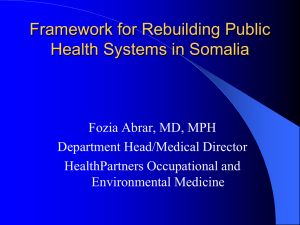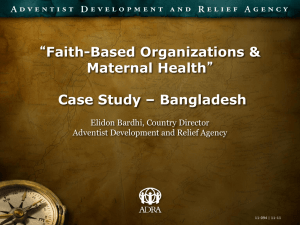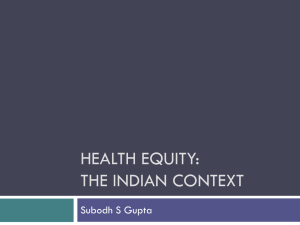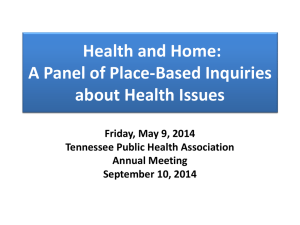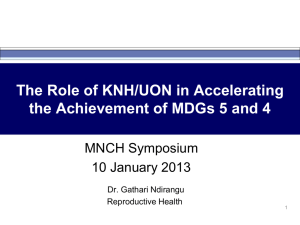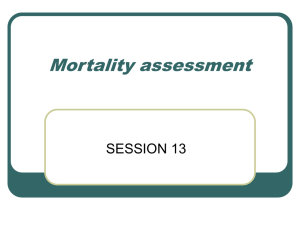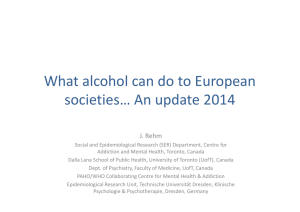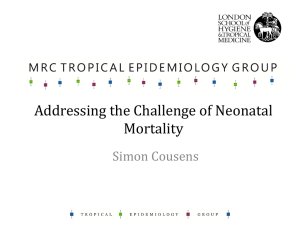Systematic Review in Maternal and Child Mortality
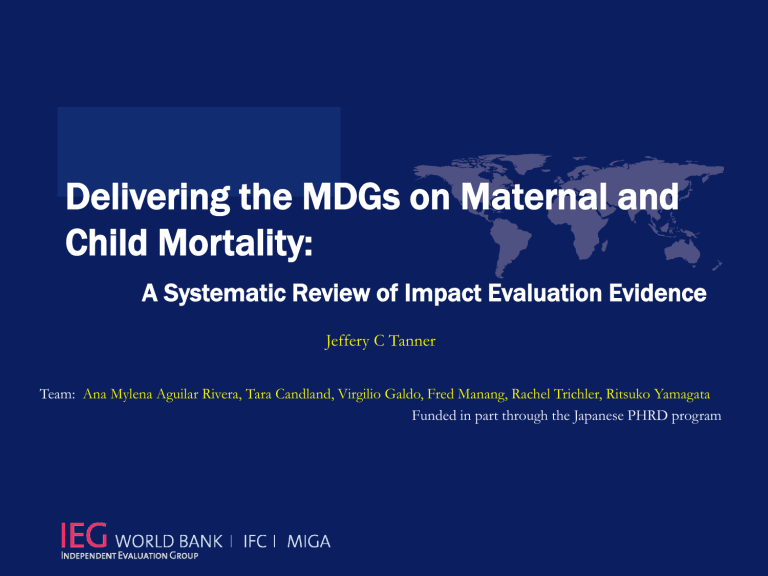
Delivering the MDGs on Maternal and
Child Mortality:
A Systematic Review of Impact Evaluation Evidence
Jeffery C Tanner
Team: Ana Mylena Aguilar Rivera, Tara Candland, Virgilio Galdo, Fred Manang, Rachel Trichler, Ritsuko Yamagata
Funded in part through the Japanese PHRD program
MDGs 4 and 5 Continue to Lag
100
80
60
40
20
0
78
100 94
87
96 96
80
51
80
52
68
38
87
100
87
72
Corresponding target Latest available value
► MDG5: ¾ Reduction in Maternal Mortality by 2015
• Main Indicator: Proportion of births attended by skilled health personnel
► MDG4: 2/3 Reduction in Under-Five Mortality
► Knowing what to do is no longer the problem; knowing how to do it remains a challenge
Objective of this Systematic Review
► Outcome-oriented approach
► Reviews impact evaluations of interventions to improve five
MCM outcomes (SBA, MM, NM, IM, U5M) and those of SBA as an intervention
► Aims to answer the following questions:
What interventions demonstrate reductions in maternal and child mortality and increase skilled birth attendance?
What do we know about the effects of increasing skilled
birth attendance?
What important knowledge gaps remain on interventions to reduce maternal and child mortality?
Conceptual model: Reducing maternal and child mortality
Strategic planning
INPUTS
Governance
Intervention areas:
National guidelines Resource generation Partnerships
Provision
Health sector Other sectors
Intervention areas:
• Service delivery
• Health financing
• Health workforce
•
•
•
Water and sanitation
Transport
Education
• Health information
• Medical products & tech •
•
Seek to affect:
Energy
Agriculture / Nutrition
- Availability - Affordability
- Equity - Efficiency
- Quality of services
Utilization
Individuals, households, communities
Intervention areas:
• Knowledge and information
• Ability to pay
• Household Environment and Infrastructure
• Transportation
Seek to affect:
- Behavioral change
- Cultural norms
- Practices
Improved access to essential maternal and child care
OUTPUTS
Improved access to basic non-health services and nutritious food
Improved healthy practices and lifestyles
OUTCOME
Reduced maternal and childhood mortality
Improved care seeking behavior and utilization
Search Criteria
► Impact Evaluations
• Experimental or Quasi-Experimental design
• Counterfactual
► Completed 1995 – Present
► Effectiveness / Policy / Field studies
• (Rather than bio-medical and efficacy trials)
► Low and Middle-Income Countries
► Representative Sample of population of interest
► Peer Review
► Report impacts on at least 1 outcome of interest
• Skilled Birth Attendance, Maternal Mortality
• Neonatal, Infant, Under-five Mortality
Search Process
► 3 Search Rounds
• Electronic, “hand” and snowball search strategies
► Review and coding into
300+ fields
► 7,000 62 studies
► Quality Ratings by Internal
Validity
• Elements of Construct and
External Validity also considered
Frequency of Impact Evaluations by Outcome and Quality
69
Impact Evaluations
Skilled birth attendant
AAA rating
10
AA rating
23
Total
33
Neonatal mortality 9 17
26
Infant mortality 11 12 23
Under-5 mortality 5 12 17
Maternal mortality 3 5 8
► AAA-quality Impact Evaluations: Established Causality
• Few, if any, remaining threats to internal validity.
► AA-quality Impact Evaluations: Likely Causality
• Some identifying assumptions untested or unclear
► Consistency Analysis. Key Results driven by AAA-rated IES
► Contextual Information considered as present in IEs
► This is a “baseline” of sorts. Thin evidence means findings are preliminary but still instructive
Sample: Standardized Effect Size--
Infant Mortality
Findings on Interventions for Mothers
► No Robust Evidence that solely increasing proportion of births with SBA affects mortality
• Only evaluated program is JSY in India: Gives a null results
– 2 IEs, High and Medium quality, both high-powered
– No effect even in areas with high (or low) quality of health services
• Critical Knowledge gap: Need more IEs on this MDG indicator
► Complimentary and reinforcing strategies that simultaneously improve both Provision and Utilization (supply and demand), esp. quality of care, knowledge, and access to services, can improve
SBA and reduce MM
► Conditional Cash Transfers, Vouchers promising
• But cannot disentangle the combined effect of utilization and quality
• May lead to unintended consequences (increased fertility)
Findings on Interventions for Children
► Community-based interventions which components and improve home-based care may reduce neonatal mortality
► Non-health sector interventions (Education, Water,
Energy) can reduce child mortality (NM, IM, U5)
► IMCI and Safe Motherhood not significant
► Though thin, the evidence is consistent that
Governance interventions can reduce child mortality
► Evidence from health sector is often significant for
AAA-rated IEs, not for AA-rated IEs
External Validity Implications: Beneficial
Impacts are more likely in problematic areas
Skilled Birth
Attendance
Neonatal
Mortality
Infant
Mortality
Under-Five
Mortality
Gaps by Region
15 IEs
3 SBA
1 NM
9 IM
7 U5
0 IEs
9 IEs
5 SBA
3 NM
3 U5
28 IEs
15 SBA
5 MM
18 NM
6 IM
4 U5
1 IE
1 MM
1 IM
15 IEs
10 SBA
2 MM
4 NM
7 IM
3 U5
Gaps by Severity
40
35
30
25
20
15
10
0
5
Skilled birth attendant
[98] [94] [93]
[84]
[49] [49]
[32]
Maternal mortality
[83] [81] [80]
[220]
[500]
[8]
Neonatalmortality
[11] [10]
[14]
[32]
[34]
[14]
Infant mortality
[17] [16]
[24]
[49]
[69]
Under 5 mortality
[108]
[17] [20] [20]
[29]
[63]
60
50
40
30
0
20
10
80
70
100
90
ECA EAP LAC MENA SA SSA ECA EAP LAC MENA SA SSA ECA EAP LAC MENA SA SSA ECA EAP LAC MENA SA SSA ECA EAP LAC MENA SA SSA
Impact Evaluations Severity
Other Gaps in Impact Evaluation Evidence
► By Intervention Type
• Governance
• Health information systems, Health Infrastructure
• Health financing
• Income generating / Labor market interventions
• Agriculture / food security / nutrition
• Transportation infrastructure
► Evaluation Components
• Distributional impacts (heterogeneous effects)
– Where reported (30%), effects are larger for disadvantaged groups
• Cost analysis
In Summary
► In spite of slow progress globally on MDGs 4 and 5, We find evidence of effective interventions to reduce maternal and child mortality.
• Governance
• SBA+
• Non-Health Sectors
► Lower SES households and Countries with higher burdens may see larger results from these interventions.
► There is no evidence that increasing skilled birth attendance alone reduces maternal or neonatal mortality.
► Important knowledge gaps remain
• Region
• Intervention Type (including SBA)
• Evaluation components
Thank you
Backup Slides
Challenges and Cautions for Systematic Reviews
► Representativeness of Interventions—non-random selection
• Overrepresentation of easily evaluable interventions
• Focus on “reduced form” studies excludes those with intermediate outcomes
• Lack of evidence does not imply no effect
► Representativeness of Impact Evaluations
• Includes only existing studies
• Publication bias (file drawer bias)
► Interpretation of Results
• IEs measure partial equilibrium; general equilibrium may be different
• Null results must be interpreted carefully—we never “accept” zero
• External validity—changes to time, place, or scale may affect results
Standardized Effect Size:
SBA--Outcome
Standardized Effect Size:
Maternal Mortality
Standardized Effect Size:
Neonatal Mortality
Standardized Effect Size:
Infant Mortality
Standardized Effect Size:
Under-Five Mortality
Skilled Birth Attendance — Outcome
► Conditional Cash Transfers and Vouchers can improve
SBA
► Interventions that bundle quality improvements with increased accessibility found can improve SBA
► Solely training health workforce or increasing awareness of safe motherhood was not observed to yield significant results
► Where reported, effects are larger for more disadvantaged households
Skilled Birth Attendance -- Intervention
► No Robust Evidence that solely increasing proportion of births with SBA affects mortality
• Only evaluated program is JSY in India: Null results for NM
– 2 IEs, AAA and AA quality, both high-powered
– No effect even in areas with high (or low) quality of health services
• Critical Knowledge gap: Need more IEs on this MDG indicator
► SBA “+” Can affect mortality and intermediate outcomes
• PLUS=Provision & Utilization: quality of care, knowledge, access
• But evidence is mixed across outcomes, even within a given study
• Unclear what explains variation in results
• Consistent, if thin, evidence on better U5M, Breastfeeding, Family planning,
Postnatal visits, Immunization, Anthropometric outcomes
Maternal Mortality
► Few (8) studies exist, concentrated in SA (5)
► Most studies underpowered to detect effects in MM
► Interventions bundling components of both health care provision and utilization can reduce maternal mortality.
• Specifically, bundling health worker training and mothers’ knowledge and information (with and without insurance)
► More evaluations are needed
• Family planning, universal health, referral systems, transport
• SSA, MENA, and LAC
Neonatal Mortality
► Interventions in non-health sectors associated with maternal education consistently lowered neonatal mortality
► Knowledge & Information interventions in the sample which change home-based care practices at the community level reduced mortality
► More IEs are needed in
• Referral Systems and Transportation
• Improvements in Quality and Availability of Health
Infrastructure for newborns
• Africa and LAC
Infant Mortality
► Interventions in non-health sectors consistently reduced IM
• Water and Sanitation
• Energy
• Education
► Governance interventions report significant effects in lowering infant mortality
► Training health workers to provide continuum of care services within communities can reduce IM
• Attention to IE quality and intervention details is important
• More AAA-quality IEs needed from other health sector interventions, SSA
► Where reported, households from lower SES benefited more
Under-Five Mortality
► Interventions in non-health sectors consistently report large reductions in under-five mortality.
► Public Participation, Service Packages may reduce U5M
► Insecticide Treated Nets are only intervention targeting three main causes of mortality that has IE evidence on
U5M
► No AAA IEs of Governance programs; but AA IEs of strategy planning & policy and monitoring & evaluation consistently reveal reduction in U5 mortality
